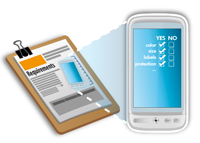 As I wrote before, we have been working hard on developing a mobile app that allows our inspectors to work on a tablet. We got to a point where it works really well on iPad. But we have had to run tests on other types of tablets at the request of a few buying offices that are interested in using our app for their own inspectors.
As I wrote before, we have been working hard on developing a mobile app that allows our inspectors to work on a tablet. We got to a point where it works really well on iPad. But we have had to run tests on other types of tablets at the request of a few buying offices that are interested in using our app for their own inspectors.
I guess many people in the industry are planning to go the same route, and I thought a comparison of the 3 big alternatives (iPad, Android, and Windows tablets) would be interesting.
1. iOS tablets
Pros:
- Great hardware. Very stable.
- iPad Mini (8.9’’ display) has a very good size factor. Not too small, not too large.
- Easy to “lock” to a certain extent (by indicating that the user is less than 13) to prevent inspectors from installing many apps that slow the whole device.
- Can open Excel, Word, and Powerpoint files. But advanced macros won’t be executed like on a Windows computer.
Cons:
- No flash, which means photos taken in a dark room are nearly worthless. Fortunately, there are many options for iPad- compatible LED flash accessories.
- The entry-level iPad Mini is cheap, but Apple makes healthy margins for iPads with large memory and 3G capability.
- Many more bugs (especially on the app management side) than I was expecting.
- The “normal” iPad is a bit too large — it is nearly impossible to take a photo with one hand while holding the product in the other hand.
2. Android tablets
Pros:
- Very wide choice or hardware.
- The Samsung Galaxy Tab line of tablets includes great tablets, but the best ones are as expensive as a good iPad or a a good Windows tablet.
- Many tablets have the flash functionality.
- Very attractive pricing on the low end (from 500 RMB).
Cons:
- This “open” OS is forking a lot. Who knows what Android tablets will look like in 5 years??
- The hardware (and especially the battery) are not always reliable on low-end devices.
- Several people told me Android is not great for opening Excel files. I still have to test the free Office viewer options (as offered by Samsung, Microsoft, etc.)
3. Windows tablets
Pros:
- These tablets work pretty much like a Windows laptop so the transition is minimal from the user perspective.
- Many of these devices can be “converted” into a laptop. The keyboard is usually better than most wireless keyboards. This is important if your inspectors have to write a lot.
- Perfect option for opening and even editing Excel, Powerpoint, or Word files.
- The Microsoft Surface line of tablets is excellent.
- There are now cheap Windows tablets on the market — it is nearly competitive with Android tablets sold under the same brands (Acer, Lenovo…).
Cons:
- I looked at all the Windows tablets in stores, and I didn’t see any with flash.
- I feel most Windows tablets are a bit too large (over 10”) — it is nearly impossible to take a photo with one hand.
- I had trouble finding the cheapest Windows tablets in stores.
—
What do you think? Any opinion or experience to share?

We have used IPad 2’s for a while with the FormConnect app. The app works well but could still use some tweaks. The IPad Air 2 takes much better low light pictures than our IPad 2’s. We are still looking for a good flash system on the IPad or case. Still looking for the perfect app. The life case NUUD case with the matching handle system allows for single handle typing and use.
Thanks Chasen for adding to the article. Yes the absence of flash is a real bummer on iPad.